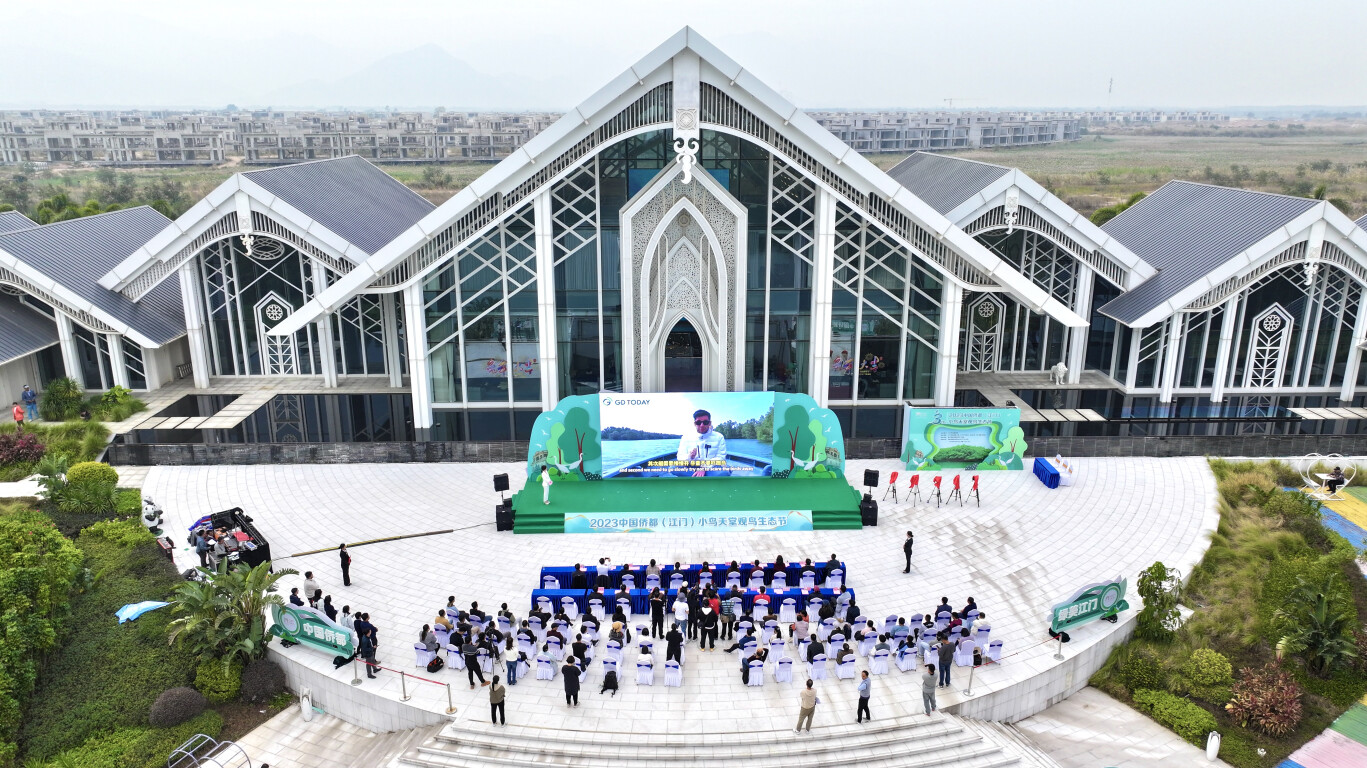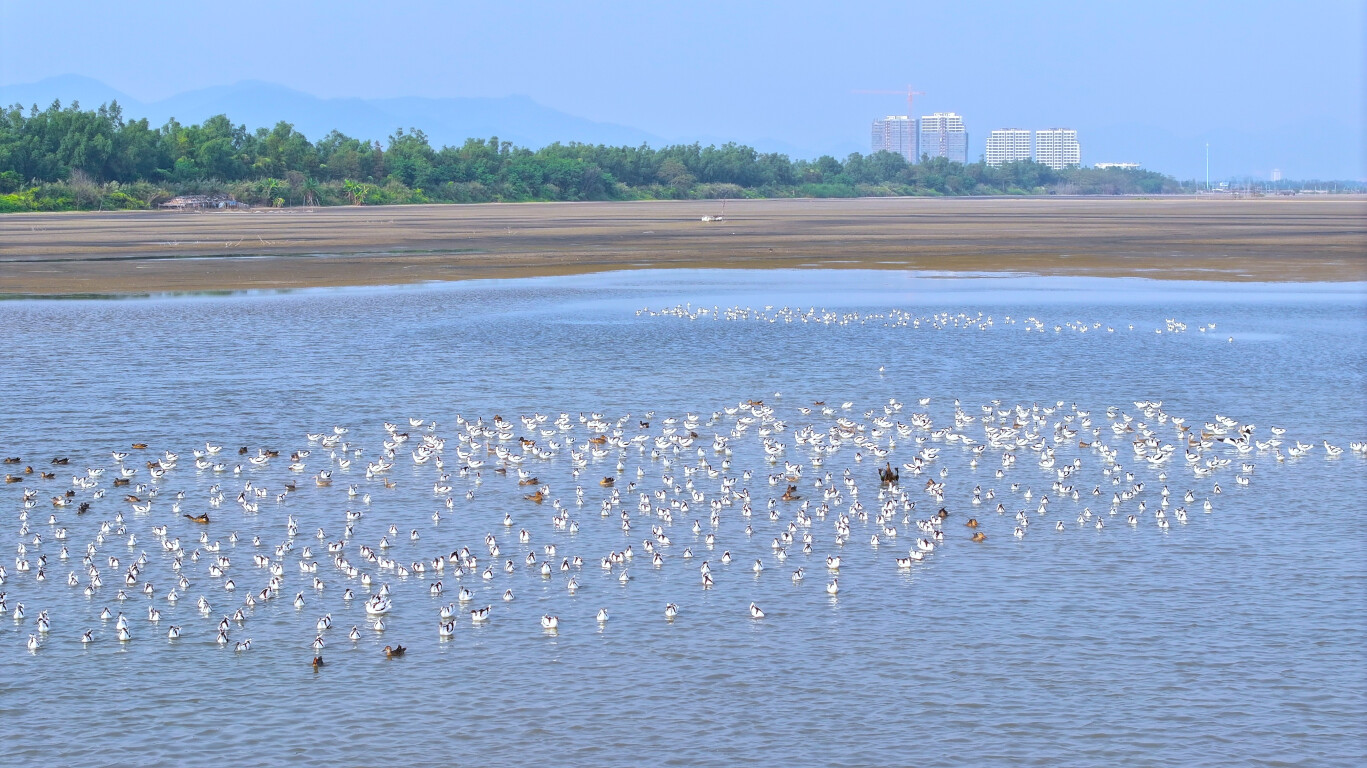In 1933, renowned Chinese writer Ba Jin visited Xinhui District in Guangdong's Jiangmen and was captivated by the myriad of birds there, leaving behind a prose masterpiece titled "Paradise of Birds," bestowing its name upon the Birds' Paradise Scenic Spot in this district.
Nine decades later, Jiangmen is witnessing an increase in these avian habitats. On December 27, the 3rd Bird-watching and Ecological Preservation Festival was inaugurated at the Yinhuwan Wetland Park in Xinhui, featuring online scientific classes and bird-watching livestreams for the public.

During the event, Venezuelan content creator Rafael Saavedra and Colombian vlogger Fernando Munoz Bernal were appointed "Jiangmen (Capital of Overseas Chinese) International Promotion Ambassador." They recently explored bird-watching blinds in Jiangmen, documenting the elegant flights of migratory birds through insightful vlogs.

Rafael Saavedra (L1) and Fernando Munoz Bernal (R1) were appointed "Jiangmen (Capital of Overseas Chinese) International Promotion Ambassador."
Anticipating migratory birds akin to waiting for the return of old friends
Located on the west side of the Yinzhou Lake estuary, the Yinhuwan Wetland in Xinhui boasts the largest contiguous area of native mangroves in the Pearl River Delta. Its lush flora and emerald waters allure a diverse array of migratory water birds.
At Yinhuwan Wetland Park, Saavedra encountered many bird enthusiasts, including Lei Lei, a birdwatcher of over 15 years. He has been a wildlife aficionado since childhood and loves to capture the beautiful plumage and agile movements of birds through his lens with a few companions, prioritizing the undisturbed observation of these creatures.
Lei introduced several birds that have appeared at the wetland park to Saavedra, including red-whiskered bulbul, egrets, and some birds under first-class national protection in China, like black-faced spoonbills.

(Photo: Nanfang Daily reporter Yang Xingle)
In recent years, Jiangmen has intensified efforts to protect and rejuvenate mangrove ecosystems. In July 2021, the city issued a plan that outlined the cultivation of 275 hectares of mangroves and the restoration of 178 hectares. As of now, Jiangmen has planted 42.19 hectares of mangroves and restored 45.15 hectares.
The lush mangroves along Jiangmen's coastline have become a favored habitat for migratory birds. In the Yinhuwan mangrove area alone, over 130 species of overwintering migratory birds have been documented, including several nationally protected species. Approximately 30 black-faced spoonbills grace this place annually, and in the past two years, oriental white storks have also been observed here.
Lei mentioned that organizations in East Asia study black-faced spoonbills, often tagging these birds. Through contact with some bird-watching organizations, it was revealed that black-faced spoonbills in Jiangmen predominantly migrate from the Republic of Korea.
"I look forward to the return of these tagged birds every year. It proves that our environment is conducive for their winter stay, and they willingly return. It's akin to eagerly awaiting the annual reunion of old friends," Lei added.
Saavedra was deeply impressed by Lei's bird-watching experience. "Here, I have the opportunity to see many birds that I have never seen before," Saavedra said, "I also felt the enthusiasm of the people of Jiangmen for nature and environmental protection. They attach great importance to the protection and sustainable development of the ecological environment, and actively participate in various environmental protection activities. This atmosphere makes me feel deeply gratified and moved."
White egrets become "permanent residents" of the water town
In Dabu village, Gulao Town, a water town in Heshan county-level city, Bernal used his camera to capture a poetic scene of soaring egrets: a lush ancient banyan tree stands on a small island in the middle of the river, with numerous egrets lingering on its branches. As dusk descends, a spectacular sight unfolds as countless birds return to their nests on this tree.
Lu Yanhui, director of the cultural, sports, and tourism office of Gulao Town, explained that as the wide and deep river here provided an ideal space for dragon boat training, the village's dragon boat committee designated it as the training base. They also planted a batch of saplings of banyan trees on the island. Over two decades, these trees have burgeoned into a flourishing forest.
Today, the tidal flats surrounding the island span over 200 mu (around 133,333 square meters), and the fish ponds extend over 3,000 mu (2 million square meters). The rich plankton reserves and an improving ecological environment have attracted a growing number of birds to nest and propagate. Originally migratory, the egrets have evolved into year-round residents, often dancing in flocks, foraging on the tidal flats, and frolicking on the branches, infusing vitality into the water town.
"To see that egrets have decided to stay here is very meaningful. It basically means that this is an environment that they enjoy, that they like, where they can thrive," said Fernando, "And it's very telling about the efforts that have been made here to improve the conditions of the environment, and it's very good to see."
Over 300 species of wild birds are distributed in Jiangmen
Situated along the East Asia-Australia migratory route, Jiangmen boasts a dozen bird-watching havens. Preliminary estimates indicate the presence of 18 bird habitats, with a surge of migratory birds seeking refuge from November to April each year.
The city currently records the distribution of over 300 wild bird species. Among them, about 50 species of birds enjoy state-level protection, including the national first-class protected birds like the black-faced spoonbill, Chinese egret, Chinese black-headed gull, black stork, and Siberian crane. Additionally, the second-class protected birds spotted here include pelican, greater coucal, black kite, red-billed leiothrix, and Chinese hwamei.
Over the years, Jiangmen has been dedicated to creating a modern harmonious coexistence between human and nature. In addition to the bird-watching festival, the city also holds a Bird-Loving Week event in the first half of each year, organizes bird protection teams and launches various initiatives to spread the awareness of protecting birds, and engage more people to join in the efforts.
Related news:
Embarking on a bird-watching journey at Jiangmen's Yinhuwan Wetland Park
Enjoying graceful flights of migratory birds in Jiangmen's Gulao water town
Planning: Olivia, Wang Yongxin
Reporter: Liu Lingzhi, Huang Xinying
Video: Rafael Saavedra, Fernando Munoz Bernal, Ou Xiaoming
Editor: Nan, James
Nina also contributed to the story.






